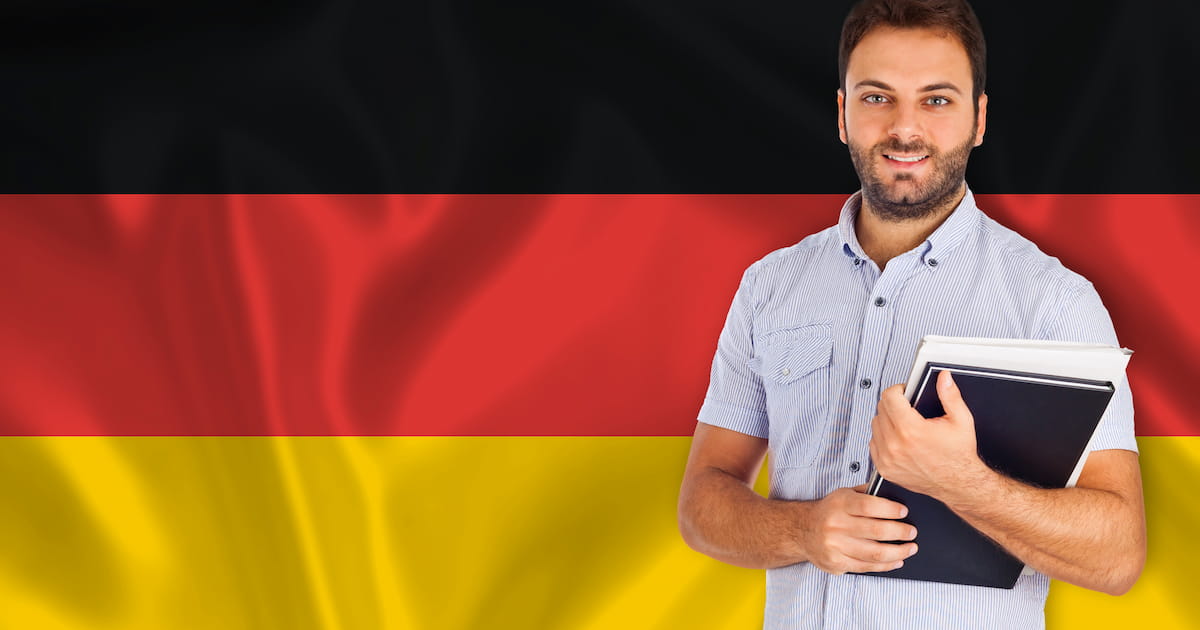You might be able to imagine it yet if you’re still in the early stages, stressing out over how to learn German vocabulary. But rest assured. The German language isn’t that hard. and One day, you will reach the point where:
your new language opens new ways to communicate and understand.
You know, the point when you are able to read your first German book.
Or get through an entire movie in German and actually know what it was about.
When you find yourself able to follow German blogs, read the newspaper in German or sing along with your favorite German songs (“99 Luftballons,” anyone?).
it’s exhilarating!
However, the road there can also be long and hard. Yet there are shortcuts calm, simple shortcuts that will keep you at ease.
On the most basic level, learning German (or any other language) comes down to this: acquiring and improving your vocabulary.
However tedious it might be at first, this phase is incredibly important to speaking and getting your feet wet in the language. Plus, knowing a few words allows you to actually start reading and understanding things around you.
In order to learn German vocabulary, we will need two things
1) words that make sense to learn and
2) a system that allows us to acquire and keep them in our heads.
But first, how much German vocab are we talking about? Let’s face it, you learn German not merely because it’s fun (you know it is) but also because you have a goal: fluency. You want to be able to converse in your new language in a natural and unhindered way and have real conversations.
To get to that point, how much German do you actually have to know?
Do you need to learn an entire dictionary by heart and be able to recite it back and forth? Or is it enough if you only know how to say soccer, beer, and sauerkraut to shine in any German conversation?
The answer, of course, lies somewhere in the middle. You don’t need the vocabulary of a young Johann Wolfgang von Goethe but you should still be able to say more than Schwarzenegger.
Overall it’s quite surprising how few words you can get by within everyday life.
It turns out that in German, as it is in every other language, there are core words that get used a lot by its speakers. Studying these frequently used words first opens up parts of the entire language.
For example, in German, the 100 most common words make up about 50% of the language. That’s right, 100 words will open up half of the commonly used German. However, since these are made up of a lot of prepositions, conjunctions, and pronouns, limiting yourself to them will not get you very far.
Long story short, research says that to understand 85% of German texts you need to know about 1,300 words. Not bad right? Totally doable. Plus, once you get to that point, you should know enough about how to learn German vocabulary to continue learning German practically through osmosis.
But how to go about getting these 1,300 German vocabulary words into your head in the first place? That’s what we are getting to now.
Essential Tools to Learn German Vocab the Stress-free Way
At first, you will need a number of tools that will:
a) help you capture new German vocab words and
b) learn them systematically. You are free to choose your own of course, but here are a few ideas.
The essential tools to help you learn German effortlessly
Notebook
Keep a small notebook on you at all times. Whether you are meeting a language partner, watching a movie, or reading a book, make sure you have some sort of vessel to capture anything noteworthy. If your cell phone works for you, fine. I personally am faster with a pen and paper.
Dictionary
Next in your tool arsenal is a good German dictionary. Favored options include the Oxford German Dictionary and the Langenscheidt Standard German Dictionary If you are not into carrying around a thick paper version, there are some great options for German dictionary apps.
Study Tool
Lastly, you need some way of actually practising your new German vocab through quizzing and repetition. This is how to memorize German vocabulary to make it actually stick. Paper vocabulary flashcards are a tried-and-true method; however, I personally prefer memorization apps with spaced repetition such as Anki and Memrise.
Another great option is FluentU, an online immersion platform that takes real-world videos—like music videos, movie trailers, news, and inspiring talks—and turns them into personalized language learning lessons. With in-context definitions, interactive captions, quizzes, and flashcards with spaced repetition, you have everything you need to learn in record time right in front of you.
Plus, with FluentU, you can learn real German as people really speak it: Watching a fun video, but having trouble understanding it? FluentU brings native videos within reach with interactive transcripts. You can tap on any word to look it up instantly.
Every definition has examples that have been written to help you understand how the word is used. If you see an interesting word you don’t know, you can add it to a vocab list. And FluentU isn’t just for watching videos. It’s a complete platform for learning. It’s designed to effectively teach you all the vocabulary from any video. Swipe left or right to see more examples of the word you’re on.
The best part is that FluentU keeps track of the vocabulary that you’re learning, and it recommends to you examples and videos based on the words you’ve already learned.
This is a level of personalization that hasn’t been done before. Start using FluentU on the website with your computer or tablet or, better yet, download the FluentU app from the iTunes or Google Play stores.
Building a 5-step System to Learn German Vocabulary
Now that you have gathered your tools, it’s time we put them to use. Our goal is to create a framework that allows you to consistently add German words to your vocabulary and that—if you stick with it—will inevitably lead to success.
As you have probably guessed from the list of tools, the process comes down to the following five steps:
- Collection
- Translation
- Processing
- Practice
- Repetition
Let’s go over them one by one.
1. Collect the unknown vocabulary
The first step in widening your Wortschatz (German for “word pool,” literally “word treasure”) is to find German words that make sense to add to your repertoire. In the beginning, this will, of course, be most words. You can either find relevant vocabulary by using existing German vocabulary lists or by exposing yourself to content and opportunities where new stuff is likely to come up (more on that below).
What’s important is that you write down any words you are unfamiliar with or anything in your own language that comes to mind that you would like to know or need to say in German.
That’s what the notebook is for.
Make it your one-stop tool for German vocab study. Don’t make the mistake of collecting new words in random places or on different scraps of paper.
That makes it much harder to be disciplined.
Collect everything in one place so you can process it all together.
2. Look up the meanings of unknown words
If you are a diligent student (which I am sure you are), you should be able to put together a long German vocabulary list in no time.
Now you need to find translations for the words (both German and your own language) to memorize their meanings. Here’s my favourite method for how to memorize German vocabulary.
What I like to do is create a large list of words in a word processor and batch input them into Google Translate. This allows me to have a huge amount of words translated instantly, and I can copy and paste both versions into an Excel file to easily import them into my study software.
However, the problem with Google Translate is that its translations are not very reliable. It spits out bogus meanings as often as it serves up the right one. The solution here is to fine-tune your list before importing and committing it to your memory.
You can do so by clicking on Google’s translation in order to see its alternatives. Seeing other possibilities will give you a better impression of the actual meaning. If that doesn’t make things clear, consult another dictionary such as dict.cc. However, I find that checking the alternate translations usually lets me choose the correct word (and some synonyms).
Should you prefer a different method of looking up German vocab (such as by hand), you can go with what works best for you. I simply found the above method to be the most efficient for my purposes.
3. Input them into your study tools
Now that you have your language pairs, they need to become part of your study system. Depending on what you are using, this can mean writing flashcards or importing a file into your memorization app. Anki, for example, allows you to import a.
CSV file with German words in one column and their counterparts in the other. From there, the software will automatically create flashcards with the language pairs on the front and back. To do so, merely input your word pairs into a spreadsheet and when saving, choose “Text CSV” as the file format.
Pick UTF-8 for the character set and make note of the field and text dividers. You will have to match the settings inside Anki for the software to properly process your word pairs. Whichever method you choose, just make sure everything gets added to your study system (no word left behind!).
4. Practice regularly
The most important part of attaining your goal of fluency is, to actually learn the words you are collecting. What good are the best tools in the world if you don’t use them? To ensure consistent study, it’s best to make it a habit. Find some time in your day where you will study your vocabulary and make it a routine.
Early in the morning, right before lunch, whenever is good for you.
Ten minutes consistently every day is better than an hour once a week on Fridays. Also, I strongly advise you to use mnemonics to maximize the retention rate.
5. Rinse and repeat
The rest of the method for how to memorize German vocab is just repetition. If you are able to write vocab in your notepad every day, the number of vocabulary words will skyrocket over time. Indeed finding five additional words per day (effectively found in a 5-minute podcast) comes out to 150 additions to your German lexicon in a month.
At that rate, you’d arrive at our target number of 1,300 words in just 8.5 months! To make it less dull, I’ve discovered that it’s best to designate one day at the end of the week for interpretation and word handling.
Sunday night works well.
That way you’ll be able to collect modern words each day for an entire week and after that chunk, input them into the system. It allows you up to concentrate on examining vocab amid weekdays too, subsequently making fewer excuses not to do it.
In any case, the key is to follow this plan consistently. When you do, getting a huge German lexicon should pose no issue at all. Force yourself to see unused words, collect them, discover their meanings, and use them. Simple and easy!





